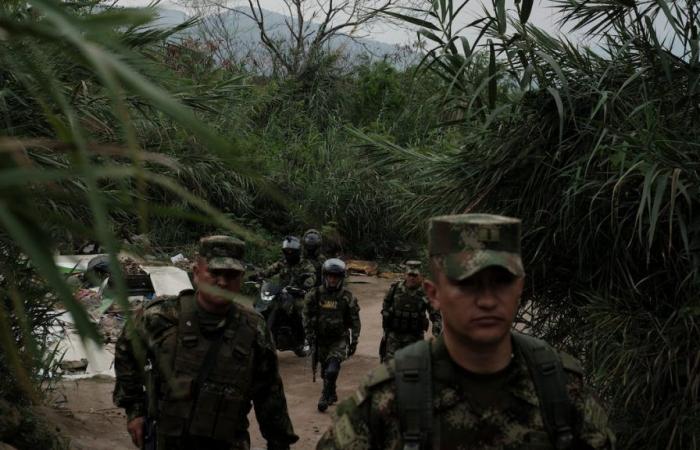It was already night when Yudy Chacón and her boyfriend, Rafael Pacheco, left a bar in the Jerónimo Uribe neighborhood, in Cúcuta, in northeastern Colombia, last holiday Monday. They had had some beers. The heat was unbearable. Suddenly the noise of a motorcycle was heard: two men were coming for them. The grillman pulled out a gun and fired. Chacón received one bullet in the head, Pacheco four. They both died. The hitmen fled and have not been captured. Two hours earlier, in the Cúcuta 75 neighborhood, Wolffan Cacua was having a few drinks at his house with a friend. Suddenly they started fighting. The friend took out a knife and stabbed him in the chest. Cacua passed away.
Chacón, Pacheco and Cacua were the last three deaths of a long and bloody weekend in the northern Santander capital. A not-so-festive holiday: the city suffered 13 murders between Friday, June 7 and Monday, June 10. The number of tragedies, rightly so, has drawn national attention. And although for Cucuteños it is also shocking news, for very few it is a surprise. Something similar happened in the last days of March: nine homicides in one weekend. In Cúcuta violence has become urbanized, and is increasingly visible.
In a city of nearly 800,000 people, there were 129 murders between January 1 and June 9, according to data from the Metropolitan Police. That’s 25 more than in the same period last year, an increase of 19%. If the metropolitan area is taken into account, where about 1,200,000 inhabitants live, there were 176, 19 more than in that period of time in 2023, 11% more.
Located on the porous border with Venezuela, where thousands of people cross every day and illicit economies such as smuggling, cocaine export, micro-trafficking, money laundering and extortion reign, for years Cúcuta has been one of the most violent cities. of the world. However, several sources assure this newspaper that this year’s homicides occur in a way never seen before: in homes, on public roads, in the city center, in areas that were thought to be untouchable.
A criminal anarchy
Newsletter
The analysis of current events and the best stories from Colombia, every week in your mailbox
RECEIVE THE
“There is criminal anarchy here. There is no safe place in Cúcuta,” says Wilfredo Cañizares, director of the Progresar Norte de Santander Foundation, via video call. “The hitmen are overwhelmed,” he adds. The anxiety is so great that ANDI, the business umbrella union, of Norte de Santander published a statement in May with 19 other unions in the region, which expressed “its deep concern about the serious deterioration of security” in the department. “We want to highlight the seriousness of the recent assassination acts that occurred in Cúcuta and the surrounding municipalities, where numerous murders have been recorded in broad daylight without the authorities being able to control the situation or explain the threat faced by the population,” it reads. in the document. According to Cañizares, an expert on the humanitarian and security situation in the region, almost 90% of the homicides that occurred this year have been by hitmen.
The mayor, Jorge Acevedo, received death threats from organized crime in January. He blames this spike in murders on a feud between several gangs. And the experts, in part, agree with him. Carlos Arturo Ramos, administrative director of the departmental network corporation of human rights defenders, assures by video call that two of the most powerful gangs in the city, Los Porras and the binational AK-47, have declared war on Los Manzaneros, led by Jayson Omar Pabón, Cucumber. This conflict has resulted in clashes in the city with weapons of war such as rifles and grenades. It is more than possible that the clash has intensified since Pepino’s father was murdered on May 16, allegedly by the Porras.
But there is not a single dispute. Ramos warns that the increase in violence may also be due to the feared Aragua Train, the ELN, the Clan del Golfo, Los Lobos, Los Ñoños, Los Pulpos, La Línea, Los Pelusos, the dissidents of the extinct FARC, or any of the 25 criminal organizations of all types of size and power that, according to the Metropolitan Police, operate in the city. In the words of Cucuteño journalist Cristian Herrera in dialogue with this newspaper: “Here there are banditas, bands and bandotas.” And they all want a piece of the illegal economies.
Herrera explains that during the nineties, when paramilitary groups clashed with guerrillas, Cúcuta became accustomed to rural violence. It was only in recent years that urban violence began to increase considerably, especially since the pandemic. It is the Colombian city with the most massacres in the last five years: 17, according to official figures. The next on that list are Barranquilla, Tumaco and Bogotá, with 12 each; The capital and largest city in the Caribbean have populations larger than those of the border city.
The migration factor
According to the journalist, the increase in violence has coincided with the arrival of gangs of Venezuelan origin such as the Tren de Aragua or the AK-47s. He assures that many members of these organizations move freely from one side of the border to the other, which makes the already complicated task of capturing them difficult. Furthermore, he points out that among the more than 200,000 Venezuelans who have settled in the city, many of them with limited economic resources, several have been exploited by organized crime. He claims that, in a city where the informal labor rate is around 70%, some of these migrants have no choice but to work for the gangs.
Cañizares, of the Progresar Foundation, refuses to blame migration. He says that organized crime, rooted in Cúcuta for years, does take advantage of the needs of these migrants, but also of young people from Norte Santander. However, for him the violence has much more to do with the enormous drop in the price of the coca leaf, due to the oversupply of that raw material for cocaine. According to the UN, a kilo of leaf is worth up to half of what it was worth today in 2022.
Precisely, Cúcuta is located in a strategic point for everything it has to do with drug trafficking. Its long border with Venezuela facilitates the shipment of drugs through Venezuelan export routes. In addition, about 200 kilometers to the north is Catatumbo, one of the largest coca-growing enclaves in the country, which produces 12% of Colombia’s coca, according to 2022 data from the Ministry of Justice. For years, violence was concentrated in that area, and in rural areas surrounding the capital of the department. But, Cañizares explains, the leaf crisis led its big buyers, the Mexican cartels, to leave the region. In search of other criminal income, and wanting to export their merchandise through Venezuela, several gangs have moved to Cúcuta, where they have joined the war for control of the city’s illegal economies.
Crime defeats institutions
Crime has defeated institutions in the city, say all those interviewed. Ramos, the human rights defender, says that “the only thing organized today in Cúcuta are the criminal gangs”: “There is no organization, no leadership on the part of the authorities that can stop this.” Yefri Torrado, a lawyer specializing in criminal law and criminology, agrees. He says that the security policies of Mayor Acevedo, who took office on January 1, fall short, as did those of the previous administration. “It seems that the authorities fell into a kind of inertia where they expect criminals to kill each other until there are no more,” he says.
Torrado says the mayor has a situational control approach, which does not work. “He talks about installing more cameras, more alarms; of more police on the street, of putting a military battalion in the city. Neither he nor the previous mayor have talked about solving the root problem,” he says. And the root problem is deep, and very difficult to solve. Cúcuta is attached to a country that has been in a humanitarian crisis for years and is the capital of one of the poorest departments in Colombia. In this context, Torrado explains that crime has become a life project for many young people in the city: “There are luxurious houses that everyone knows are bought with money from money laundering. There are communes that the Police can hardly reach. Informality is 70%. What other opportunities do young people have?”
For him, solutions are needed not only from the Mayor’s Office and the Government, but also from the Administration of President Gustavo Petro. “It seems that the national government has not set its sights here,” he says. He assures that there are no conversations about urban peace with the gangs, as is being done in Medellín, Buenaventura or Quibdó, and that a “more comprehensive solution” is needed that incorporates all sectors of society.
It is a position that Cañizares shares. “There are 150 informal settlements in this city. There are gangs that patrol at night with rifles. The majority of the population is dedicated to foraging. This is a cocktail,” he laments. According to him, the situation will only change if the national government decides to confront organized crime in the city: “Neither the Government nor the State have been able to design a serious strategy to confront crime. “They have turned their backs on Cúcuta.”
Subscribe here to the EL PAÍS newsletter about Colombia and here to the channel on WhatsAppand receive all the information keys on current events in the country.






